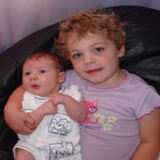Child Development Milestones
Child Development Milestones are physical or behavioral signs of development or maturation of infants and children.
This page presents an overview of normal child development in general, including typical activities and achievements from 15 months to three years of age.
When you browse to the age appropriate milestones, it is important to keep in mind that the time frames presented are averages.
Some children may achieve various toddler baby development milestones earlier or later than the average but still be within the normal range.
Child Development Milestones
What is Normal Child Development?
Child development refers to how a child becomes able to do more complex things as they get older.
Development is different than growth. Growth only refers to the child getting bigger in size.
When we talk about normal child development, we are talking about developing skills like:
- Gross motor: using large groups of muscles to sit, stand, walk, run, etc., keeping balance, and changing positions.
- Fine motor: using hands to be able to eat, draw, dress, play, write, and do many other things.
- Language: speaking, using body language and gestures, communicating, and understanding what others say.
- Cognitive Thinking skills: including learning, understanding, problem-solving, reasoning, and remembering.
- Social: Interacting with others, having relationships with family, friends, and teachers, cooperating, and responding to the feelings of others.
What are Child Development Milestones?
Child development milestones are a set of functional skills or age-specific tasks that most children can do at a certain age range.
Your pediatrician uses baby developmental milestones or infant milestones to help check how your baby is developing.
Although each milestone has an age level, the actual age when a normally developing child reaches that milestone can vary quite a bit.
But Remember....Every Child is Unique!
There are many programs available trying to raise IQ and speed up normal child development in general, but ....
Easy Everyday Steps Regarding Developmental Milestones
Here are some suggestions:
- Activities for Toddlers & Parents.
- Reading aids in baby language development and pre-reading skills.
- You will find these resources on reading to children
to help you make the most of this special time.
- Here is a great preschool book list.
Electronic input for young children should be limited to no more than 2 hours per day (that includes "educational" programs).
Keep an eye on this site as I'll be adding a lot of articles on child development.
Find It!
Can't remember where you read something specific? Just type in your search term in the box below and your specific topic will be returned to you instantly.









